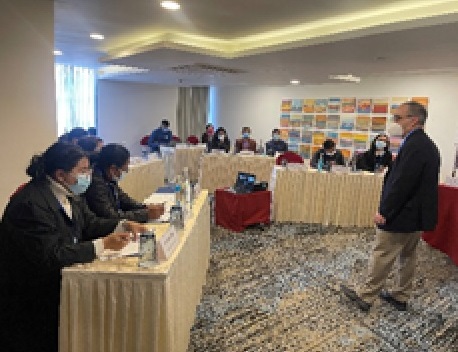A team from the Wayne State University School of Medicine’s Office of Global Affairs, led by Marcus Zervos, M.D., assistant dean of Global Affairs, and the Henry Ford Health System’s Global Health Initiative, visited Nepal this month in support of public health work that included addressing COVID-19, hospital Infection prevention and control, and antimicrobial resistance.
WSU faculty and Henry Ford Health System Global Health Initiative representatives, with the Nepal GTA Foundation, conducted a two-day workshop regarding integrated activities and tools, including training surrounding the World Health Organization's toolkit for antimicrobial stewardship in low- and middle-income countries. The workshop, organized in collaboration with the Quality, Standard and Regulation Division of Nepal’s Ministry of Health and Population, was planned in conjunction with the WHO's Antimicrobial Resistance Awareness Week to ensure effective antibiotic treatment for patients today and tomorrow.
Antimicrobial resistance awareness is a global public health concern, with major threats to underdeveloped countries like Nepal. In accordance with the workshop's goals and aims, health care professionals were trained in a more conservative use of antibiotics, and in policy level-advocacy regarding the awareness and rational use of the drugs.
A total of 10 participant physicians were invited from five different hospitals categorizing governmental, non-governmental organizations and community/university-run hospitals. The participants will utilize training from the workshop to perform as antimicrobial resistance awareness champions to implement and advocate for stewardship programs at their hospitals.
The WHO’s Antimicrobial Stewardship toolkit is a comprehensive package for implementing programs at hospitals in low- and middle-income countries. The toolkit includes focused leadership to physicians, nurses, microbiologists, pharmacists and housekeeping staff. A feasibility study looking at the implementation and integration of toolkits in health care settings was undertaken in Nepal and three other countries, led by GTA and Henry Ford staff.
Madan Upadhayaya, M.D., chief of the Quality, Standard and Regulation Division of the Ministry of Health and Population, started the session by welcoming Dr. Zervos, Anita Shallal, M.D., and Tyler Prentiss, in addition to the GTA facilitation team. His talk emphasized the importance of antimicrobial stewardship initiatives and highlighted ministry administrators who have prioritized immediate actions in the field of antimicrobial resistance, including finalization of a national action plan throughout Nepal.
National experts Rajesh Dhoj Joshi, M.D., hospital director, and Basudha Shrestha, M.D., senior consultant microbiologist, at Kathmandu Model Hospital, highlighted the national antimicrobial resistance awareness context and antimicrobial guidelines. Pan Bahadur Kshetry, senior drug administrator for the ministry, explained the Nepalese policy, plan and programs, and the need for infection prevention and control programs.
Dr. Zervos, division head of Infectious Diseases at Henry Ford Health System and assistant dean at Wayne State University, is a global leader on infectious disease. Dr. Shallal, M.D., is an Infectious Diseases global health fellow in the Henry Ford Hospital Division of Infectious Disease, and Tyler Prentiss is the senior program manager for Henry Ford Health System. They facilitated the sessions.
December 12, 2021